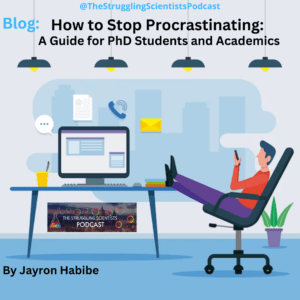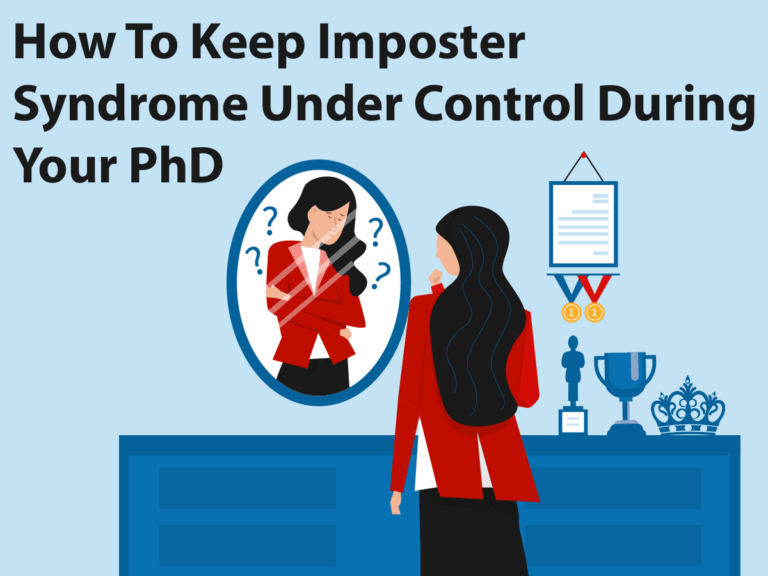What is Imposter Syndrome?
Imposter syndrome is a psychological phenomenon that refers to the general feeling of doubting your abilities and feeling like a fraud. It often occurs in people who are considered high-achievers and causes them to doubt their skills, talents, accomplishments, and results in them internalizing a fear of being exposed as a fraud.
Many academics struggle with imposter syndrome, yet despite it being a common struggle very few resources are readily available to help academics and more specifically PhD students tackle their feeling of imposter syndrome.
During my PhD I struggled a lot with the feeling of being an imposter, this was before I knew what imposter syndrome even was. As if I wasn’t worthy or deserving of being a PhD student and that at some point my colleagues would discover this. I constantly felt like I was a failure in the lab neither working hard nor fast enough.
After 5 years of doing my PhD, several published scientific articles, a finished thesis, and zero people actually calling me a fraud, I still find myself combatting my imposter syndrome daily.
I wish I could say it will just naturally go away over time but the truth is it doesn’t. That being said, there are ways I’ve personally found that reduce the impact of imposter syndrome on my life.

So while not an exhaustive list these are some of the ways I’ve found have worked for me to reduce my imposter syndrome and I hope they might do the same for you as well. Also at the end, I will reference additional methods that while they did not work for me might still be of use to you.
Ask Yourself Why?
This was where I started my journey to combat imposter syndrome. The first step in solving a problem is to properly define what that problem is. While imposter syndrome has many common characteristics among those who suffer from it no two people are the same.
To define why you are experiencing imposter syndrome you need to get to the root cause of what triggers that feeling for you. What situations, environments, people, and moments around you are initiating this behavior and why does it happen perhaps in one area of your life and not the other?

For me, this question helped me pinpoint which aspects of my PhD were triggering imposter syndrome while in other areas of my life, there was no mention of it.
By asking myself this question I realized that one of the main contributing factors to why I was feeling like an imposter during my PhD was that I felt I required the approval of others to feel/know that my PhD was going well or not while that wasn’t the case for other endeavors in my life.
Was publishing a paper good? Should I have 2 papers published by now? Am I doing as well as others? Am I living up to expectations? These questions and variations thereof were what I was constantly asking myself and it made the PhD feel like the goalpost was constantly moving further away no matter how much I advanced.
However, once I had pinpointed the cause(s) of my imposter feelings I could start looking for ways to mitigate their impact on my life.
What needs to happen for me to not feel that way?
Now that you have gained more clarity as to why you feel the way you do you can move on to the next step. That is to prevent negative feelings from arising by asking “What needs to happen for me to not feel that way?”.
While it may not be 100% possible to eradicate your imposter feelings it might be possible to get ahead of them and reduce their impact on your life.
By asking yourself “What needs to happen for me to not feel that way?” before you start any project or task that might trigger imposter feelings you set a specific definition of what success will look like.
By doing this, you prevent the goalpost from constantly moving and make a mental note of your accomplishment which you will be less likely to discount after you’ve achieved it.
When I published my first scientific article, I immediately discounted the achievement because in my mind it needed to be better and done much earlier than what it ended up being, and that was on me.
This disparaging of accomplishments after the fact becomes less likely once you have taken the time to consider this question. By using this question, I realized I would not feel like an imposter if I could just send a version of my next paper to my co-authors to review. Just getting to that step would already be a massive win from where I started.
From that point onward until the eventual acceptance of that paper I no longer felt like an imposter. I had done the thing I set out to do at the start so every step forward was free of imposter feelings for me.
Important to note, that your answer to this question needs to be achievable. If you’re hoping to get a Nobel Prize and you won’t stop feeling like an imposter until that happens then you might be waiting for a long time. So with that said, keep the goal reasonable.
Focus on Learning
Often with imposter syndrome, we feel like an imposter because we don’t have all the answers we think we should or that we think others have. This idea shifts our focus from the learning and growth we undergo while undertaking a new project to simply accomplishing the project.
With any difficult project that you may encounter during your PhD you will inevitably learn a lot because, at the start of the project, you don’t know the outcome of the experiments or the solutions to the problems you’ll face along the way.
Adopting a mindset that focuses on learning instead of the results is healthier and better for you in the long run. This mindset enables you to frame every challenge and obstacle you encounter as simply an obstacle and not as a personal failing on your part.
I’ve had a lot of success applying this mindset to other areas of my life as well including marathon running and podcasting. In both instances, I started as someone who knew nothing about either but saw each obstacle in my way as a learning opportunity on my way to running my marathon or being a podcaster.
At a certain point, it becomes like a badge of honor to have faced an obstacle and overcome it. The hardships you endure in the beginning will make the hardships later on more bearable.
As Thomas Edison once said:
“I have not failed. I've just found 10,000 ways that won't work.”
Thomas Edison Tweet

Practice Mindfulness
You’ve probably come across similar advice elsewhere but the reason it keeps getting repeated is that it does help.
Imposter Syndrome tends to distort our thoughts and memory of events so much that we end up accepting much of the blame when things go wrong, and almost none of the credit when it goes well.
Hence why you need a way to either quiet those negative thoughts or amp up the positive thoughts. That’s where mindfulness comes in.
Now there are many ways to practice mindfulness, and I am certainly not an expert in the subject but I can tell you what worked for me. In my case, I tried two different approaches namely journalling as well meditation.
Both of these practices served different purposes. Meditation helped quiet the negative thoughts, while journalling helped amp up the positive thoughts and make them less ephemeral by actually writing them somewhere.

Both of these practices are also easy to get started with to build a habit out of them. For meditation, I usually stick with 10-15 mins a day with my eyes closed while focusing on my breath. While for journalling, I tried various forms however what ended up sticking was journalling for 30 mins in the evening before going to bed.
This normally entails writing down how my day went and how I’m feeling. What I’m thinking about at the moment, and plans and ideas for the upcoming day. I’ve also dabbled in some wonderful journal prompts that I’ve found online which can help provide clarity as well as provide a base to start journaling.
But of course, this might not work for you so feel free to experiment with both meditation and journaling so you can find what is optimal for you.
If you’re interested in reading more on how mindfulness can help you during your PhD you can check out “6 Work-life Balance Tips for PhD Students“
Focus on the Gains
As mentioned previously, imposter syndrome tends to distort your thoughts, especially regarding achievements. You often either take all the blame or none of the credit so it helps to take time to take note of your successes or “gains” as and when they happen.
This is a practice I came across from the book “The gap and the gain” which focuses on actually writing down what your “gains” for the day are instead of always focusing on how much you need to still do to accomplish a task (gap).

Focusing on the gains keeps you motivated to keep acquiring more gains on your journey while focusing on the gap only reinforces the fact that you haven’t reached the destination yet and will only de-motivate you.
This method while simple will over time give you a scorecard that you can look back it and see all the progress that you’ve made.
In particular, I’ve used and continue to use this method every day to remind myself that I am making progress on papers, my thesis, my marathon training, the podcast, and overall being a good partner.
It’s a super easy method to get started with and you can keep it as concise or as detailed as you want. Either pen and paper or digital is fine for writing down your gains. How I do it is every day I open up my Notion calendar and write down my “gains” for that day as checkboxes which I check off.
It’s an extremely simple method that has worked wonders for me and costs almost nothing in terms of time or money to get started with.
The Other Methods
As I mentioned at the start I came across various methods to try and combat imposter syndrome and not all of them worked out for me but I would still like to list them here in case they may be of some use to you.
Many of them are similar in some cases to the methods I’ve listed earlier but differ in their exact application. Again this is a matter of preference and there is no one objectively best way to combat imposter syndrome.
At the end of the day whatever works best is what works best for you and whatever is easiest for you to stick with. So here they are:
CV of Failures
A Curriculum Vitae (CV) of failures is exactly as it sounds. You write a CV only this time you don’t highlight all your achievements but instead highlight all the times you failed. These include all the rejections you’ve received as well as projects and tasks that have failed.
This idea of a CV of failures was first published in Nature by Dr. Melanie Stefan in 2010 and has since been used by many people.
I first heard about this in the book “You are not a Fraud “ by Marc Reid (previous guest on the podcast) who refers to it as a method to normalize bringing our “failures” to the forefront. In so doing this would help to get rid of the feeling that everyone is successful and doing well and that we are the only ones struggling as imposters.
Writing your CV of failures and reading that of others can be a refreshing experience and can mitigate Imposter Syndrome for some. The only reason I did not list this and the other two methods after this is that they just didn’t work for me. With that said, here is an example of a CV of failures by Princeton professor of economics Johannes Haushofer.
Fear Setting
I first heard about “Fear Setting” by watching a TED talk by Tim Ferriss. In it, he highlights his brush with suicide and the philosophy that not only saved him but also inspired the concept of fear setting.
This philosophy is Stoicism and in it, there is the idea/exercise of “Premeditatio Malorum” which translates to the premeditation of evils. This exercise helps you to visualize the worst-case scenarios that you face and are afraid of and by doing so helps you to start taking action to prevent and mitigate their impact.
Tim Ferriss has a more systematic approach inspired by premeditation Malorum called fear setting. With the fear setting method you start by writing down three columns titled “define”, “prevent”, and “repair”.
From there, you begin by defining what your fear or problem actually is under the “define” column. You then think of ways you can prevent or minimize the risk of that fear or problem occurring. This you write under the “prevent” column.
Lastly, should the worse come to pass and that fear or problem does end up occurring you can also write down in the “repair” column what you can do to salvage the situation.
The image below illustrates an example of this with a writing deadline I faced with my most recent paper. While I did not use fear setting to combat my imposter feelings at the time I can see it helping someone else in a similar situation.
Simply writing down and defining, preventing, and repairing your fears or problems can go a long way to discredit those imposter feeling you are facing. Given that fear setting is rooted in stoicism I want to leave you with a stoic quote that deeply touched me.
“We suffer more often in imagination than in reality”
Seneca Tweet

Talking with Mentors and Colleagues

You would be surprised how many people around you struggle with Imposter Syndrome daily and to what extent. Of course, it doesn’t seem like it from our perspective but no matter what level of success you obtain those feelings never truly go away.
It can be both insightful and calming to simply start a conversation with your colleagues about it. By normalizing the imposter experience and especially openly discussing it, we gradually loosen its hold on us and our mental health.
Quick note. Choose whom you open up to wisely as some people will refuse to acknowledge any imposter feelings or may simply have never heard about the phenomenon and so may not be the ideal candidates for discussion on the subject.
Final Thoughts
Many people suffer from Imposter Syndrome but that doesn’t mean you need to keep suffering as much as you do. Some methods can help and here I’ve listed some that have helped me and others as well you can try out. It is possible to combat these imposter feelings but it will take time, patience, and figuring out what works best for you.











One Response
Thankѕ for some other eҳcеllent pօst. The place else could anybody get that
type of information in such an idеal method of writing?
I’ve a presentation next week, and I am on the search for suⅽh
info.